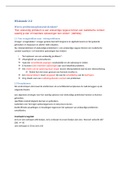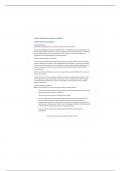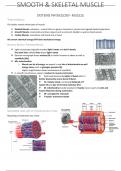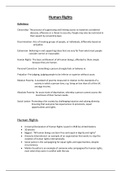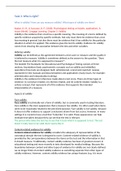(Chapter 1
8/27/24
“soc”; partner, comrade
“Ology”; the study of
Sociology : the scientific study of human social relations, groups, and societies.
Social embeddedness; the idea that everything around us comes from social relations
Sociological imagination ; oftentimes we think that things are personal but in reality they’re
public (for example: when you think you’re the only one going through things).
Structure vs agency
Agency: can be understood as the ability of individuals and groups to exercise free will and to
make social changes on a small or large scale. (“microsociology” looking at things at an
individual scale)
Structure: can be defined as patterned social arrangements that have effects on agency and are in
turn affected by agency (looking at larger scales)
Individual human agency (individual acts against social structure)
Collective human agency (group acts against social structure- social movement)
Critical thinking: is the ability to evaluate claims about truth by using reason and evidence
1. Be willing to ask any question, no after how difficult
2. Think logically and be clear
3. Back up your arguments with evidence
4. Think about the assumptions and biases-including your own
5. Avoid anecdotal evidence (just because something happened to you it will continue to
happen)
6. Be willing to admit when you are wrong or uncertain about your results
The birth and rise of sociology
- The scientific revolution offers scholars a more advanced understanding of the physical
world (biology, chemistry etc)
- The enlightenment took scientific understandings and applied them to human affairs like
equality, liberty, and fundamental human rights
- The industrial revolution changed traditional economies transforming small towns to
bustling cities, showcasing extremes between wealth and poverty as well as opportunity
and struggle
- Urbanization involved the population shift towards cities creating issues like pollution,
crime, and crowding
Auguste Comte(1798-1857) (was basically the founding father of sociology)
- French social theorist credited with founding modern sociology
, - Primarily concerned with Social statics (the way society is held together) and social
dynamics (the laws that govern social change)
- His goal was to study sociology the same way you would study a body. He took on a
positivist orientation to social research
- He argued that there are 3 stages that all societies go through
1.) Theological stage- key ways to understanding the world is framed by
superstitions, imagination and religion
2.) Metaphysical stage (maybe there is a pattern to this. Cloud example). Abstract
speculation framed by the basic relief that society is framed by natural rather than
supernatural forces
3.) Scientific reasoning and “facts”
Emile durkheim (1858-1917); studied social facts(consists of two things; they’re external (they
aren’t relating to us personally and control what we do) (ex: laws are created before, during, and
after people but control what we do) to us and they are coercive and was the first to make
sociology an academic discipline
- The big 3 : actual theories themselves or a theoretical perspective
High Low
Integration Altruistic (you’re too Egoisitc (when someone is
committed to something that alone and someone decides to
you’re willing to give your commit suicide)
life)
Regulation (control, rules) Fatalistic Anomic (when people don’t
like chaos)
Mechanical solidarity: before the industrial revolution. Social bonds that are present in
pre-modern agrarian societies where people share traditions and beliefs creates a sense of
cohesion
Organical solidotary: If something is organic it’s more freeflowy. Social bonds presents in
modern societies based on interdependence and individual rights
Karl Marx (1818-1883); having harmony and equilibrium isn’t within human nature (since we
have war, poverty, etc).
- Proletariat; the workers, the average people
- Bourgeoise; those that own the industries)(bougie people got the money
,Within capitalism there is class conflict that will result in revolution.
Means of production; where goods are being produced.
Social change isn’t evolutionary it is bc of conflict (ex: civil rights movement, people had to
fight and speak up to be able to obtain a change)
Max Weber (1864-1920) ; he’s going to be the agency. Trying to understand how individual
people are understanding their world. You have to place yourself in the shoes of others
Verstehen is the German word for interpretive understanding.
Ex: time
Charlotte Perkins Gilman (1860-1935)
- Well known novelist, feminist, and sociologist, that was inspired by her aunts and well
known activist isabelle beecher stowe and harriet beecher stowe
- The yellow wallpaper follows the decline of a married woman to a highlight the
consequences of women’s lack of autonomy in marriage
Harriet Martineau (1802-1876)’
-english deaf soci
W.e.b. Dubois
He spoke openly against the deep seated racism
9/5/24
Sociological theories are logical, rigorous frameworks for the interpretation of social life that
make particular assumptions and ask
1. Structural functionalism: seeks to explain social organization and change in terms of the
roles performed by the different social structures, phenomena, and institutions (Emile
Durkheim associated with this)
2. Structure: a social institution that is relatively stable over time and meets the needs of
society by performing functions necessary to maintain social order and stability (ex:
family, schools, educational institutions, government healthcare system etc)
Two main principles of structural functionalism
1. Society is conceived as a stable, ordered system made up of interrelated parts (or
structures)
2. Each structure has a function that contributes to the continued stability (equilibrium) of
the unified whole
, Social conflict paradigm (also known as conflict theory): seeks to explain social organization and
change in terms of the conflict that is built into social relationships. It’s not enough to say
something serves a function, it’s only enough to those who are superior.
Symbolic interactionism: argues that both the individual self and society as a whole are the
products of social interactions based on language and other symbols.
Symbols: are representations of things that are not immediately present to our senses. For
example, words, gestures, emoticons, tattoos, etc
DIscover sociological research (new slides)
The scientific approach
—> the scientific method” standard procedures used to acquire and verify empirical data
What does it mean for something to be empirical?
Empirical: description of what we can observe and experience directly through human senses
(touch, sight, hearing, smell, taste), or indirectly using techniques that extend the sense.
Deductive vs inductive reasoning:
Deductive reasoning: starts from broad theories about the social world but proceeds to break
them down into more specific hypotheses, or ideas about the world derived from theories that
describe possible relationships between social phenomena. (more for organized
people)(quantitative research)
Inductive reasoning: starts from specific data, such as interviews, observations, or field notes,
that may focus on a single community or event and endeavors to identify larger patterns from
which to derive more general theories. (filing it out and noticing patterns before coming with a
conclusion) (qualitative research)
Quantitative research- translates the social world into numbers and statistics that can be studied
mathematically
Qualitative research- uses non-numerical data from text, interviews, photos, observations, and
recordings to help understand social life
9/10/24z
The language of sociological research
Concepts: ideas that summarize a set of phenomena (ex: stratification, social class, power,
inequality and diversity)
8/27/24
“soc”; partner, comrade
“Ology”; the study of
Sociology : the scientific study of human social relations, groups, and societies.
Social embeddedness; the idea that everything around us comes from social relations
Sociological imagination ; oftentimes we think that things are personal but in reality they’re
public (for example: when you think you’re the only one going through things).
Structure vs agency
Agency: can be understood as the ability of individuals and groups to exercise free will and to
make social changes on a small or large scale. (“microsociology” looking at things at an
individual scale)
Structure: can be defined as patterned social arrangements that have effects on agency and are in
turn affected by agency (looking at larger scales)
Individual human agency (individual acts against social structure)
Collective human agency (group acts against social structure- social movement)
Critical thinking: is the ability to evaluate claims about truth by using reason and evidence
1. Be willing to ask any question, no after how difficult
2. Think logically and be clear
3. Back up your arguments with evidence
4. Think about the assumptions and biases-including your own
5. Avoid anecdotal evidence (just because something happened to you it will continue to
happen)
6. Be willing to admit when you are wrong or uncertain about your results
The birth and rise of sociology
- The scientific revolution offers scholars a more advanced understanding of the physical
world (biology, chemistry etc)
- The enlightenment took scientific understandings and applied them to human affairs like
equality, liberty, and fundamental human rights
- The industrial revolution changed traditional economies transforming small towns to
bustling cities, showcasing extremes between wealth and poverty as well as opportunity
and struggle
- Urbanization involved the population shift towards cities creating issues like pollution,
crime, and crowding
Auguste Comte(1798-1857) (was basically the founding father of sociology)
- French social theorist credited with founding modern sociology
, - Primarily concerned with Social statics (the way society is held together) and social
dynamics (the laws that govern social change)
- His goal was to study sociology the same way you would study a body. He took on a
positivist orientation to social research
- He argued that there are 3 stages that all societies go through
1.) Theological stage- key ways to understanding the world is framed by
superstitions, imagination and religion
2.) Metaphysical stage (maybe there is a pattern to this. Cloud example). Abstract
speculation framed by the basic relief that society is framed by natural rather than
supernatural forces
3.) Scientific reasoning and “facts”
Emile durkheim (1858-1917); studied social facts(consists of two things; they’re external (they
aren’t relating to us personally and control what we do) (ex: laws are created before, during, and
after people but control what we do) to us and they are coercive and was the first to make
sociology an academic discipline
- The big 3 : actual theories themselves or a theoretical perspective
High Low
Integration Altruistic (you’re too Egoisitc (when someone is
committed to something that alone and someone decides to
you’re willing to give your commit suicide)
life)
Regulation (control, rules) Fatalistic Anomic (when people don’t
like chaos)
Mechanical solidarity: before the industrial revolution. Social bonds that are present in
pre-modern agrarian societies where people share traditions and beliefs creates a sense of
cohesion
Organical solidotary: If something is organic it’s more freeflowy. Social bonds presents in
modern societies based on interdependence and individual rights
Karl Marx (1818-1883); having harmony and equilibrium isn’t within human nature (since we
have war, poverty, etc).
- Proletariat; the workers, the average people
- Bourgeoise; those that own the industries)(bougie people got the money
,Within capitalism there is class conflict that will result in revolution.
Means of production; where goods are being produced.
Social change isn’t evolutionary it is bc of conflict (ex: civil rights movement, people had to
fight and speak up to be able to obtain a change)
Max Weber (1864-1920) ; he’s going to be the agency. Trying to understand how individual
people are understanding their world. You have to place yourself in the shoes of others
Verstehen is the German word for interpretive understanding.
Ex: time
Charlotte Perkins Gilman (1860-1935)
- Well known novelist, feminist, and sociologist, that was inspired by her aunts and well
known activist isabelle beecher stowe and harriet beecher stowe
- The yellow wallpaper follows the decline of a married woman to a highlight the
consequences of women’s lack of autonomy in marriage
Harriet Martineau (1802-1876)’
-english deaf soci
W.e.b. Dubois
He spoke openly against the deep seated racism
9/5/24
Sociological theories are logical, rigorous frameworks for the interpretation of social life that
make particular assumptions and ask
1. Structural functionalism: seeks to explain social organization and change in terms of the
roles performed by the different social structures, phenomena, and institutions (Emile
Durkheim associated with this)
2. Structure: a social institution that is relatively stable over time and meets the needs of
society by performing functions necessary to maintain social order and stability (ex:
family, schools, educational institutions, government healthcare system etc)
Two main principles of structural functionalism
1. Society is conceived as a stable, ordered system made up of interrelated parts (or
structures)
2. Each structure has a function that contributes to the continued stability (equilibrium) of
the unified whole
, Social conflict paradigm (also known as conflict theory): seeks to explain social organization and
change in terms of the conflict that is built into social relationships. It’s not enough to say
something serves a function, it’s only enough to those who are superior.
Symbolic interactionism: argues that both the individual self and society as a whole are the
products of social interactions based on language and other symbols.
Symbols: are representations of things that are not immediately present to our senses. For
example, words, gestures, emoticons, tattoos, etc
DIscover sociological research (new slides)
The scientific approach
—> the scientific method” standard procedures used to acquire and verify empirical data
What does it mean for something to be empirical?
Empirical: description of what we can observe and experience directly through human senses
(touch, sight, hearing, smell, taste), or indirectly using techniques that extend the sense.
Deductive vs inductive reasoning:
Deductive reasoning: starts from broad theories about the social world but proceeds to break
them down into more specific hypotheses, or ideas about the world derived from theories that
describe possible relationships between social phenomena. (more for organized
people)(quantitative research)
Inductive reasoning: starts from specific data, such as interviews, observations, or field notes,
that may focus on a single community or event and endeavors to identify larger patterns from
which to derive more general theories. (filing it out and noticing patterns before coming with a
conclusion) (qualitative research)
Quantitative research- translates the social world into numbers and statistics that can be studied
mathematically
Qualitative research- uses non-numerical data from text, interviews, photos, observations, and
recordings to help understand social life
9/10/24z
The language of sociological research
Concepts: ideas that summarize a set of phenomena (ex: stratification, social class, power,
inequality and diversity)

